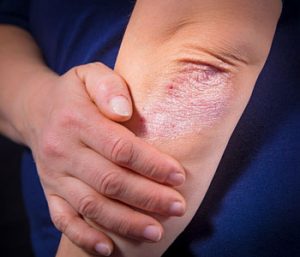Dry, itchy skin can be annoying and can impact your everyday life. Dry, itchy patches may be a symptom of a number of skin conditions, including psoriasis. If you have psoriasis on your face and/or body or it is negatively affecting your life, it is time to seek treatment from a dermatologist. Conveniently located in Dulles, VA, the board-certified dermatologists at Dulles Dermatology Associates, now a part of U.S. Dermatology Partners, are available to treat a range of skin ailments including psoriasis.
What is Psoriasis?
Psoriasis is a chronic, autoimmune skin condition affecting approximately 7.5 million adults and children in the United States. The condition may flare up and go away at random. Triggers may include stress, dry air, infections, medication, too much or too little sun exposure, alcohol, or smoking.
Patients who have psoriasis experience rapid skin cell production. The cells multiply and regenerate faster than the body can process and eliminate them. Without the time to remove the cells, excess dry skin can build up. For some patients, the skin is not the only thing affected. The nails or joints may be impacted as well. Depending upon your immune system, there are a number of symptoms of psoriasis. Patients with weakened immune systems may experience more severe symptoms. Symptoms may include:
- Rashes
- Dryness
- Skin flaking or peeling
- Cracked skin
Itchy skin is the most common symptom found in nearly 90 percent of psoriasis cases. Itchiness is caused by the scaly, flaking, inflamed skin. Patients have described the feeling as burning, biting, or painful sensations. For some, it is the most annoying part of the condition as it brings on the urge to scratch. Unfortunately, scratching can worsen the problem. It may increase skin inflammation, scales, and itchiness.
Is there a cure for psoriasis?

Topical treatments
Topical medications are often the first line of defense, especially for mild cases of psoriasis. These treatments slow cell reproduction so there are fewer excess skin cells. This also reduces skin inflammation and redness so your symptoms are more tolerable. Treatments may include shampoos, moisturizers, or medications that contain vitamin D or vitamin A.
Call our office at (844) 357-3376 or click here to Request an Appointment!
Oral or injectable treatments
Internal medications may be oral or injectable treatments. These may be used if relief is not found with topical treatments. Oral or injectable medications may target the cause of the psoriasis rather than treating the symptoms. Since the immune system is compromised in patients with psoriasis, internal medications are designed to target the immune system itself. The medications suppress the immune response.
Phototherapy expectations

With any treatment or therapy, it is important to have realistic expectations. A slight worsening of symptoms may appear initially. Redness or itchiness may occur. However, consistency is key as reactions or flare ups resolve with regular treatments. Phototherapy is often performed a few times per week. If needed, maintenance treatments may be done to prolong periods of remission.
At Dulles Dermatology Associates, now a part of U.S. Dermatology Partners, we will work with you to create a customized plan with the most appropriate treatment methods. For some patients, one treatment method may work. Other patients may need a combination of options.
Let us help ease your psoriasis symptoms so you can live more comfortably. Call (844) 357-3376 to schedule your appointment today.
Click here to Request an Appointment!

